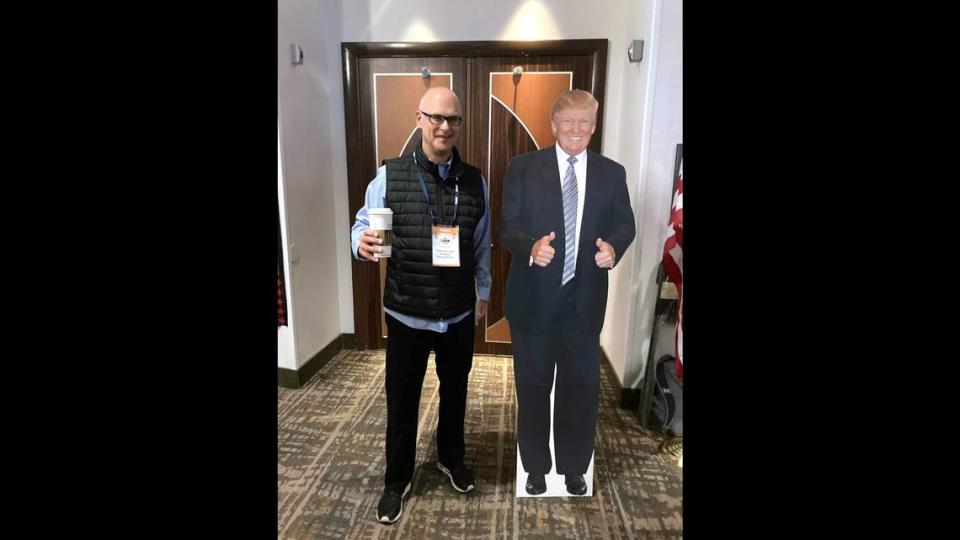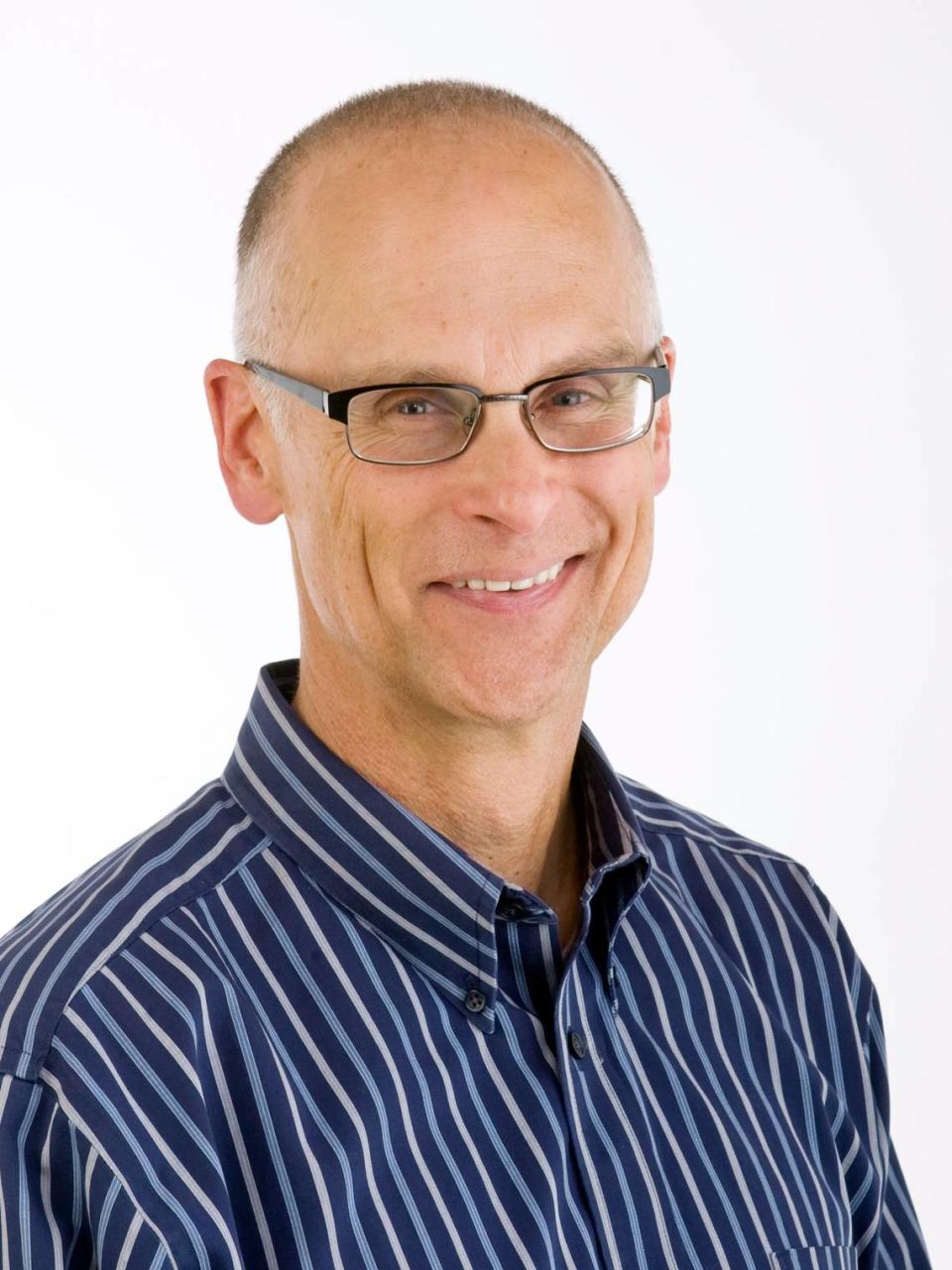A love letter to journalism: The Bee opinion editor recalls highs, lows of 50-year career
- Oops!Something went wrong.Please try again later.
Today I write a love letter to journalism. I cannot recall the actual date I became a journalist. However, my passion for journalism began at The Hilltopper student newspaper at La Colina Junior High in Santa Barbara and has continued nearly every day in the five decades since.
On Friday, I will turn 65, so it’s time for Medicare to kick in and for me to put down the proverbial pen. The nonstop demands of the digital era as well as our national political dysfunction have made for lots of tension. It’s time to decompress.
That said, journalism has been my lifelong passion, and it has not left me disappointed.
The highs have been many: Flying with a Navy Blue Angel in an F-18 off the California coast. Interviewing leaders like Gov. Gavin Newsom and U.S. Sen. Dianne Feinstein. I covered then-President Ronald Reagan walking into his Santa Ynez Valley polling place to cast his ballot for his re-election.
Opinion
I have covered fires, floods and droughts. As a young reporter, I witnessed a CHP officer pull back a tarp at a crash scene to reveal a dead driver — the first time I had ever seen a deceased person.
I once covered a USC football game in the Los Angeles Coliseum. I interviewed wardens in the main hallway of the maximum-security prison in Lompoc as some of the most dangerous inmates in America walked by.
Covering the first space shuttle launch in Florida after the Challenger disaster was thrilling.
Though countless city council and school board meetings were mundane, community journalism has always been important.
There have been awful moments as well.
One that stands out was the early July evening in 1990 that turned into a fiery hell in Santa Barbara. The Painted Cave Fire burned hundreds of homes and killed two people. I worked nearly 24 hours before I took a break.
There was 9/11, the only time in my career when my newsroom cranked out an extra edition. Those special copies were all gone within the hour of hitting the streets. What a horrific day.
I once wrote a column about a dear friend who died of cancer. My angle was how the medical world was abuzz trying to figure out this new virus — HIV. My column was my way of making sure the fight against cancer was not forgotten.
In the 1980s I shared a bureau with a fantastic reporter who taught me to love community journalism. But she smoked constantly. I later helped bear her coffin in a funeral Mass after she died of lung cancer.
Through it all, I embraced the idea that journalism makes a difference — that an informed community can be a better place. I still believe that, and my colleagues in McClatchy do as well.
Trump and his ‘fake media’ lie
Last fall I got to cover Donald Trump at the California GOP’s fall convention in Anaheim. He got up to the microphone and just started riffing on his favorite topics — our border with Mexico, smash-and-grab criminals, Democratic socialists ruining California. It was stream-of-consciousness political theater. It was scary.
Then he turned his attention to journalists seated at the back of the huge ballroom.
“And there’s the fake media,” he shouted, and nearly every person in the room turned and began booing.
The reporter next to me stood up and bowed. I laughed.
But it is not funny when Trump calls the press the “enemy of the people.”
The reporters, photographers, and editors I have known love their country and cherish its freedoms. We make a solemn commitment to ask hard questions of those in charge, be they elected officials, corporate leaders, or social influencers. We do it because Americans have a right to know.
How I hope Americans don’t surrender that precious right to self-serving politicians who want to keep them in the dark.
‘Nixon Resigns’
As a boy, I delivered my hometown newspaper, the Santa Barbara News-Press, with the headline, “Nixon Resigns.” From that moment when President Richard Nixon resigned in 1974. in part due to revelations unearthed by journalists that Nixon and his campaign had spied on Democrats, I was hooked. A career in journalism was inevitable.
Before the professional work, there were student newspapers. I would later work for the News-Press for 15 years. My career has also featured stops in Santa Maria, San Luis Obispo and now Fresno.
Early on newsrooms were full of smells and sounds now relegated to the past. I remember linoleum floors, rotary phones, and cigarette smoke. At my first job, one editor after a deadline would reach into a desk drawer, pull out a liquor bottle, stuff it into a brown paper bag and head out to his car for “lunch.”
My career has marched with the rise of tech. When I began, IBM Selectric typewriters were how stories got written. Newspaper pages still got pasted up by compositors. There was no online world — just papers and broadcasts.
Then came computers for word processing and page layout. No more composing room wax.
Next was cellular technology. My company gave me a big phone with a stand that was screwed into the console of my car. Flip phones, Blackberries and iPhones followed.
The Bee has been my home for the last 11 years, and I am glad it gets the final chapter in my career. It will be hard to let go of Scoopy, the longtime McClatchy mascot, but it is time.
My heart is full of gratitude to the strong executive editors who have been my teachers over the years, to the smart peers who shared a better way to do things, and to the sources who patiently addressed my constant questioning.
Now I will depend on my Bee colleagues to provide me with the information I need to make good decisions. I know they will do just that. They are idealists, too. Here’s to them, and keeping up the good work.


